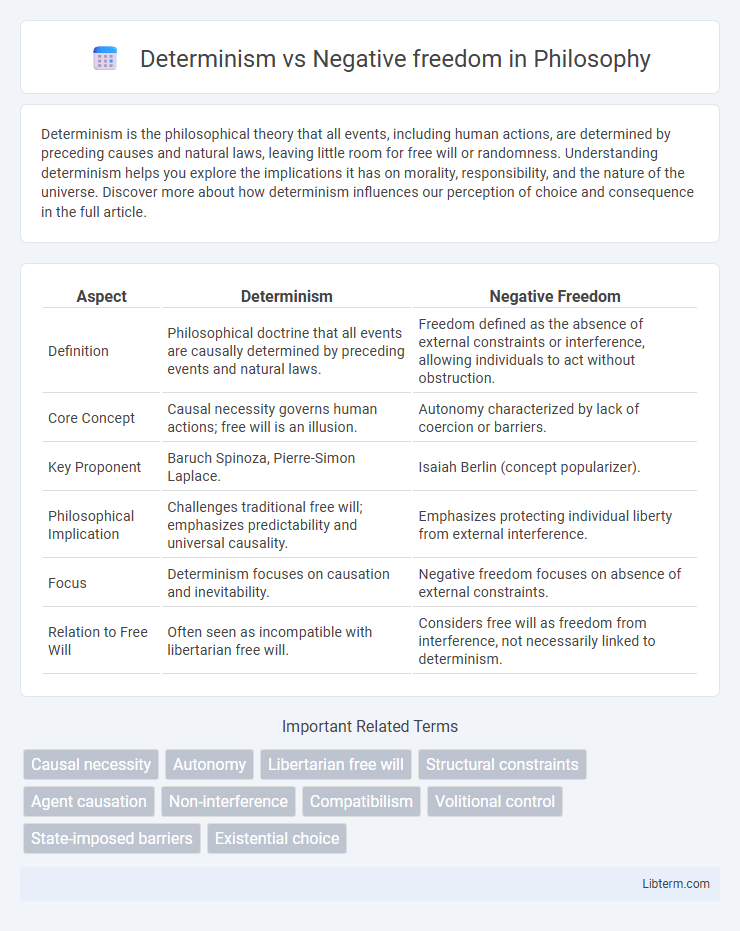Determinism is the philosophical theory that all events, including human actions, are determined by preceding causes and natural laws, leaving little room for free will or randomness. Understanding determinism helps you explore the implications it has on morality, responsibility, and the nature of the universe. Discover more about how determinism influences our perception of choice and consequence in the full article.
Table of Comparison
| Aspect | Determinism | Negative Freedom |
|---|---|---|
| Definition | Philosophical doctrine that all events are causally determined by preceding events and natural laws. | Freedom defined as the absence of external constraints or interference, allowing individuals to act without obstruction. |
| Core Concept | Causal necessity governs human actions; free will is an illusion. | Autonomy characterized by lack of coercion or barriers. |
| Key Proponent | Baruch Spinoza, Pierre-Simon Laplace. | Isaiah Berlin (concept popularizer). |
| Philosophical Implication | Challenges traditional free will; emphasizes predictability and universal causality. | Emphasizes protecting individual liberty from external interference. |
| Focus | Determinism focuses on causation and inevitability. | Negative freedom focuses on absence of external constraints. |
| Relation to Free Will | Often seen as incompatible with libertarian free will. | Considers free will as freedom from interference, not necessarily linked to determinism. |
Understanding Determinism: A Brief Overview
Determinism asserts that every event or state, including human decisions, is the inevitable result of preceding causes, emphasizing a causal chain that limits free will. Understanding this framework clarifies how negative freedom, defined as freedom from external constraints, interacts with predetermined conditions influencing choices. Analyzing these concepts highlights the tension between causal necessity and individual autonomy in philosophical discourse.
What is Negative Freedom? Core Concepts
Negative freedom refers to the absence of external constraints or interference, allowing individuals to act according to their own will. It emphasizes non-intervention by others, ensuring that no external force limits personal choices or actions. Core concepts include autonomy, self-ownership, and the protection of individual liberties from coercion or restriction.
Historical Context: Philosophers on Determinism and Freedom
Philosophers such as Baruch Spinoza and Thomas Hobbes laid foundational ideas in determinism, arguing that human actions are predetermined by prior causes and natural laws. In contrast, Isaiah Berlin introduced the concept of negative freedom, emphasizing the absence of external constraints on the individual's will. This historical dialogue highlights the tension between asserting causal necessity and advocating for personal autonomy within political and ethical frameworks.
The Relationship Between Determinism and Human Agency
Determinism posits that every event, including human actions, is causally determined by preceding events, challenging the concept of free will and human agency. Negative freedom, defined as freedom from external constraints, faces tension under determinism because if choices are pre-determined, autonomy may be illusory despite lack of interference. The relationship between determinism and human agency revolves around whether individuals can be genuinely responsible agents when their decisions are influenced by an unbroken chain of cause and effect.
Negative Freedom in Political and Social Thought
Negative freedom emphasizes the absence of external constraints, allowing individuals to act according to their own will without interference from authorities or social structures. In political and social thought, this concept is central to liberalism, highlighting the protection of individual rights against coercion by the state or other groups. The theory contrasts sharply with determinism, which suggests actions are predetermined by external factors, thereby challenging the ideal of unfettered personal autonomy.
Compatibility or Conflict: Can Determinism Allow Negative Freedom?
Determinism, which posits that all events are causally determined by prior states, raises critical questions about the viability of negative freedom--defined as freedom from external constraints. The debate hinges on whether determinism is compatible with negative freedom; compatibilists argue that even if actions are determined, individuals remain free as long as they act without coercion or interference. In contrast, incompatibilists claim that determinism inherently restricts genuine negative freedom, as choices are ultimately shaped by prior causes rather than autonomous will.
Criticisms of Determinism from the Liberty Perspective
Criticisms of determinism from the liberty perspective argue that it undermines individual autonomy by suggesting all actions are preordained, eliminating true freedom of choice. This viewpoint highlights the incompatibility between determinism and negative freedom, which centers on the absence of external constraints allowing self-directed action. Philosophers like Isaiah Berlin emphasize that if determinism holds, the concept of liberty, as non-interference in decision-making, becomes meaningless.
The Ethical Implications of Restricting Negative Freedom
Restricting negative freedom, defined as freedom from external constraints, raises critical ethical concerns regarding autonomy and moral responsibility. Determinism challenges the notion of free will, complicating the justification for limiting individual freedoms since actions may be seen as causally determined rather than freely chosen. Ethical frameworks must balance societal order with the preservation of negative freedom to avoid unjust oppression and respect personal agency.
Contemporary Debates: Future of Determinism vs. Negative Freedom
Contemporary debates on determinism versus negative freedom center on the implications of neuroscientific discoveries and AI advancements for human autonomy and moral responsibility. Proponents of determinism highlight empirical evidence suggesting that decisions are often predetermined by neural mechanisms, challenging traditional notions of negative freedom as the absence of external constraints. Critics argue that negative freedom remains essential for ethical accountability, emphasizing the role of social and legal frameworks in preserving individual agency despite deterministic influences.
Conclusion: Navigating the Tension between Determinism and Negative Freedom
Navigating the tension between determinism and negative freedom requires recognizing the complexity of human agency within causally determined frameworks. While determinism challenges the notion of unconstrained choice, negative freedom emphasizes the importance of removing external constraints to allow autonomous action. Balancing these perspectives involves fostering environments where individuals can exercise freedom without ignoring the causal factors shaping their decisions.
Determinism Infographic

 libterm.com
libterm.com